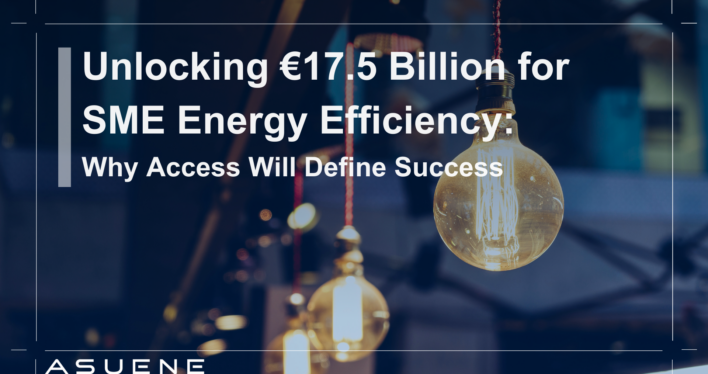- Article Summary
-
Introduction
The European Union has pledged €17.5 billion to support small and medium-sized enterprises (SMEs) in financing energy efficiency and decarbonization projects. This initiative is intended to enhance competitiveness, build resilience, and accelerate the transition to a low-carbon economy. However, the success of this funding does not lie in the size of the commitment alone. It will depend on whether SMEs, which make up 99% of EU businesses, can actually access and benefit from these resources. Without addressing accessibility, the EU risks missing the transformative potential of this historic investment.
The EU’s €17.5 Billion Commitment Explained
The financing package, supported by the European Investment Bank (EIB), aims to mobilize up to €65 billion in investment through leverage. The funding is tied closely to the EU’s Green Deal, Fit for 55 targets, and REPowerEU agenda, all of which stress energy security and reduced reliance on fossil fuels. SMEs are a natural focus, given that they make up around 99% of EU businesses and account for an estimated 9% to 18% of overall energy consumption, according to EU-funded research such as the LEAP4SME project. Representing such a large share of both the economy and energy use, enabling SMEs to cut consumption through improved energy management would be a huge step toward meeting EU climate and competitiveness goals.
The Accessibility Challenge for SMEs
Despite the promise of large-scale funding, many SMEs face structural barriers that limit their ability to participate:
| Barrier | SMEs | Large Companies |
|---|---|---|
| Application process | Often complex and resource-intensive | Better resourced teams to handle bureaucracy |
| Technical expertise | Limited internal capacity | Dedicated energy managers and consultants |
| Financing capacity | Struggle with co-financing or collateral | Easier access to credit and capital |
| Awareness | Often unaware of available programs | Better informed through networks and advisors |
If these issues are not resolved, there is a high risk that larger corporations will absorb the majority of funds, leaving SMEs underrepresented. Past EU funding programs show that SME uptake often falls short unless targeted measures are introduced.
Why Accessibility Will Define Success
The EU’s energy transition depends on more than headline commitments. SMEs represent an enormous untapped opportunity for efficiency gains and emissions reductions. If they cannot access financing, the EU will miss out on a significant portion of potential energy savings. Moreover, accessibility ensures fairness and prevents the concentration of benefits in a few large firms.
Accessible funding could enable wide-scale deployment of energy-saving measures in industries ranging from manufacturing to retail and logistics. This would directly contribute to achieving EU climate goals while boosting the resilience and competitiveness of Europe’s backbone businesses.

Solutions to Unlock SME Access
For the EU’s commitment to succeed, accessibility must be prioritized:
- Simplify processes with one-stop-shop application systems and standardized forms.
- Provide technical assistance to help SMEs structure and present their projects.
- Leverage local institutions such as regional banks, credit unions, and chambers of commerce as trusted intermediaries.
- Ensure fair allocation by setting SME-specific quotas and transparent disbursement rules.
- Highlight success stories to encourage broader participation and build confidence.
These measures would not only enhance SME access but also strengthen the legitimacy and impact of the EU’s green financing policies.
Conclusion
The EU’s pledge of €17.5 billion marks a historic opportunity to empower SMEs in the clean energy transition. Yet, the real challenge lies not in announcing large sums but in ensuring that funding reaches those who need it most. By focusing on accessibility, the EU can turn financial ambition into measurable climate action, competitive advantage for SMEs, and long-term energy resilience.
At the same time, SMEs will need practical tools to manage and measure their progress once funding is secured. This is where solutions like our energy management system NZero become vital. By providing clear insights into energy consumption, emissions, and efficiency opportunities, NZero helps SMEs translate financing into real-world impact. It enables businesses to cut costs, reduce carbon footprints, and demonstrate compliance with EU sustainability goals.
The message is clear: success will be defined not by the size of the commitment, but by how widely and effectively it is accessed, and by how well SMEs can use systems like NZero to turn that access into lasting change.
Why Work with ASUENE Inc.?
ASUENE is a key player in carbon accounting, offering a comprehensive platform that measures, reduces, and reports emissions. The company serves over 10,000 clients worldwide with an all-in-one solution that integrates GHG accounting, ESG supply chain management, a Carbon Credit exchange platform, and third-party verification.
Through its energy management system NZero, ASUENE provides SMEs with the practical tools to make the most of EU funding for energy efficiency. NZero combines advanced technology, consulting services, and an extensive partner network to help companies achieve their net-zero goals. By choosing ASUENE, SMEs gain not only access to reliable carbon accounting but also a powerful EMS platform designed to unlock energy savings and long-term sustainability success.


